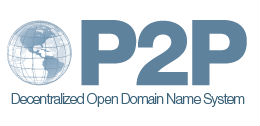In a direct response to the domain seizures by US authorities during the last few days, a group of established enthusiasts have started working on a DNS system that can’t be touched by any governmental institution.
Ironically, considering the seizure of the Torrent-Finder meta-search engine domain, the new DNS system will be partly powered by BitTorrent.
In recent months, global anti-piracy efforts have increasingly focused on seizing domains of allegedly infringing sites. In the United States the proposed COICA bill is explicitly aimed at increasing the government’s censorship powers, but seizing a domain name is already quite easy, as illustrated by ICE and Department of Justice actions last weekend and earlier this year.
For governments it is apparently quite easy to take over the DNS entries of domains, not least because several top level domains are managed by US-based corporations such as VeriSign, who work closely together with the US Department of Commerce. According to some, this setup is a threat to the open internet.
To limit the power governments have over domain names, a group of enthusiasts has started working on a revolutionary system that can not be influenced by a government institution, or taken down by pulling the plug on a central server. Instead, it is distributed by the people, with help from a BitTorrent-based application that people install on their computer.
According to the project’s website, the goal is to “create an application that runs as a service and hooks into the hosts DNS system to catch all requests to the .p2p TLD while passing all other request cleanly through. Requests for the .p2p TLD will be redirected to a locally hosted DNS database.”
“By creating a .p2p TLD that is totally decentralized and that does not rely on ICANN or any ISP’s DNS service, and by having this application mimic force-encrypted BitTorrent traffic, there will be a way to start combating DNS level based censoring like the new US proposals as well as those systems in use in countries around the world including China and Iran amongst others.”
The Dot-P2P project was literally started a few days ago, but already the developers are making great progress. It is expected that a beta version of the client can be released relatively shortly, a team member assured TorrentFreak.
The project has been embraced by many familiar names in the P2P-community. Former Pirate Bay spokesman Peter Sunde is among them, and the people from EZTV have been promoting it as well.
“For me it’s mostly to scare back. To show that if they try anything, we have weapons of making it harder for them to abuse it. If they then back down, we win,” Peter Sunde told TorrentFreak in a comment.
Although the initiators of the project are still debating on various technical issues on how the system should function, it seems that the administrative part has been thought out. The .p2p domain registration will be handled by OpenNIC, an alternative community based DNS network. OpenNIC also maintains the .geek, .free, .null and several other top level domains.
On the other hand, there are also voices that are for distributed domain registration, which would keep the system entirely decentralized.
The domain registrations will be totally free, but registrants will have to show that they own a similar domain with a different extension first, to prevent scammers from taking over a brand.
The new P2P-based DNS system will require users to run an application on their own computer before they can access the domains, but there are also plans to create a separate root-server (like OpenNIC) as a complimentary service. It’s worth noting that the DNS changes will only affect the new .p2p domains, it will not interfere with access to any other domains.
It will be interesting to see in what direction this project goes and how widely it will be adopted. There are already talks of getting Internet Service Providers to accept the .p2p extension as well, but even if this doesn’t happen the system can always be accessed through the BitTorrent-powered application and supporting DNS servers.
If anything, this shows that no matter what legislation or legal actions are taken, technology stays always one step ahead. The more aggressive law enforcement gets, the more creative and motivated adopters of the Open Internet will respond.


 In a direct response to the domain seizures by US authorities during the last few days, a group of established enthusiasts have started working on a DNS system that can’t be touched by any governmental institution.
In a direct response to the domain seizures by US authorities during the last few days, a group of established enthusiasts have started working on a DNS system that can’t be touched by any governmental institution.



